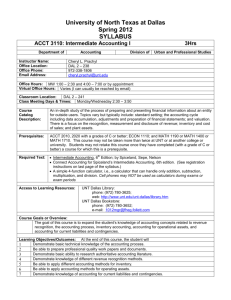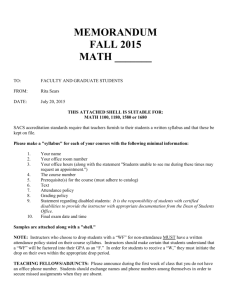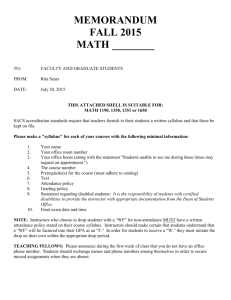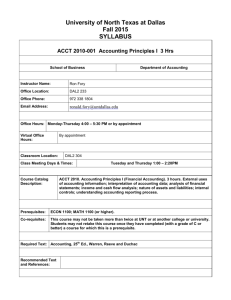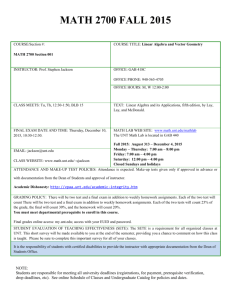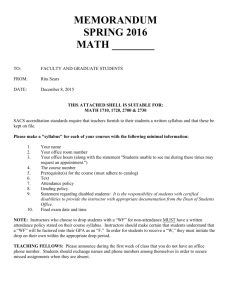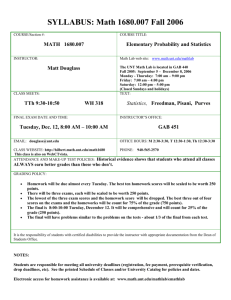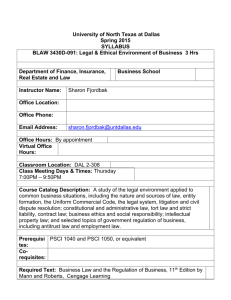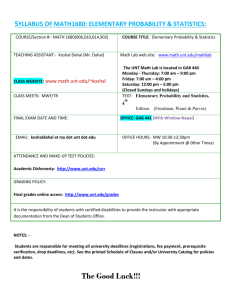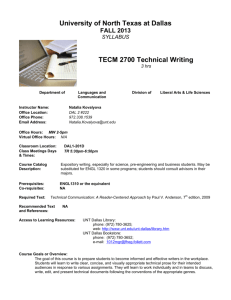ACCT 4100 Syllabus Spring 2012
advertisement
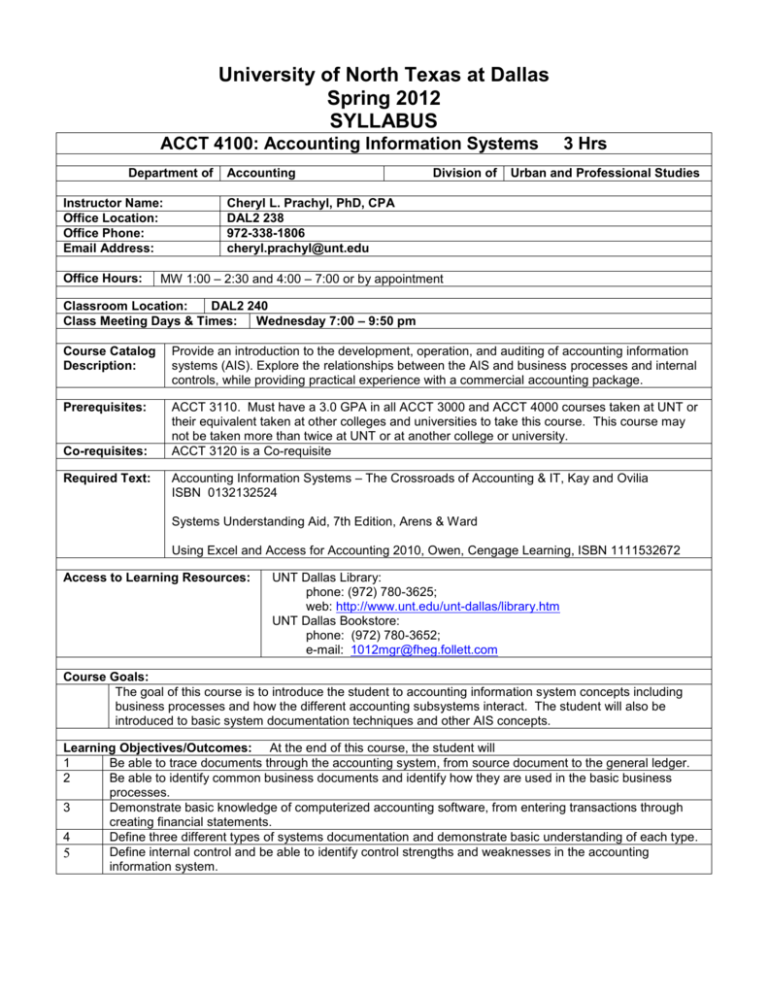
University of North Texas at Dallas Spring 2012 SYLLABUS ACCT 4100: Accounting Information Systems Department of Instructor Name: Office Location: Office Phone: Email Address: Office Hours: Accounting Division of 3 Hrs Urban and Professional Studies Cheryl L. Prachyl, PhD, CPA DAL2 238 972-338-1806 cheryl.prachyl@unt.edu MW 1:00 – 2:30 and 4:00 – 7:00 or by appointment Classroom Location: DAL2 240 Class Meeting Days & Times: Wednesday 7:00 – 9:50 pm Course Catalog Description: Provide an introduction to the development, operation, and auditing of accounting information systems (AIS). Explore the relationships between the AIS and business processes and internal controls, while providing practical experience with a commercial accounting package. Prerequisites: ACCT 3110. Must have a 3.0 GPA in all ACCT 3000 and ACCT 4000 courses taken at UNT or their equivalent taken at other colleges and universities to take this course. This course may not be taken more than twice at UNT or at another college or university. ACCT 3120 is a Co-requisite Co-requisites: Required Text: Accounting Information Systems – The Crossroads of Accounting & IT, Kay and Ovilia ISBN 0132132524 Systems Understanding Aid, 7th Edition, Arens & Ward Using Excel and Access for Accounting 2010, Owen, Cengage Learning, ISBN 1111532672 Access to Learning Resources: UNT Dallas Library: phone: (972) 780-3625; web: http://www.unt.edu/unt-dallas/library.htm UNT Dallas Bookstore: phone: (972) 780-3652; e-mail: 1012mgr@fheg.follett.com Course Goals: The goal of this course is to introduce the student to accounting information system concepts including business processes and how the different accounting subsystems interact. The student will also be introduced to basic system documentation techniques and other AIS concepts. Learning Objectives/Outcomes: At the end of this course, the student will 1 Be able to trace documents through the accounting system, from source document to the general ledger. 2 Be able to identify common business documents and identify how they are used in the basic business processes. 3 Demonstrate basic knowledge of computerized accounting software, from entering transactions through creating financial statements. 4 Define three different types of systems documentation and demonstrate basic understanding of each type. Define internal control and be able to identify control strengths and weaknesses in the accounting 5 information system. Course Outline This schedule is subject to change by the instructor. Any changes to this schedule will be communicated by notification in Blackboard (eCampus). Date TOPICS Jan 18 25 Feb 1 8 15 22 29 Mar 7 14 21 28 Apr 4 11 18 25 May 2 9 Due Dates Part 1: Enterprise Accounting Systems: People, Processes, and Technology Chapter 1 – Accounting Information Insights Chapter 2 – Accounting Databases Chapter 3 - Accounting Interface: Database Forms, Queries, and Reports Exam 1 – Chapters 1, 2, 3 Chapter 4 – Accounting Systems and Business Processes Chapter 5 – Business Processes: Purchasing, Sales, and Payroll Cycles Chapter 7 – Accounting and Business Intelligence Exam 2 – Chapters 4, 5, 7 Spring Break Chapter 8 – Accounting and Sustainability Intelligence Chapter 9 – XBRL – Intelligent Business Reporting Chapter 10 – Fraud and Internal Control Chapter 11 – Cybersecurity Exam 3 – Chapters 8, 9, 10, 11 Chapter 12 – The Risk Intelligent Enterprise; Enterprise Risk Management Chapter 13 – Accounting System Development Chapter 14 – Database Design: ERD, REA, and SQL Exam 4 Review for final exam Comprehensive Final Exam 7:30 – 9:30 pm Class Website: A class website will be established and maintained throughout the course on eCampus (go to http://www.unt.edu/dallas and click the link at the top for “eCampus”). Course materials such as assignments will be available on eCampus. You will also be able to view your grades on the web site. Course Evaluation Methods This course will utilize the following instruments to determine student grades and proficiency of the learning outcomes for the course. Exams – There will be four exams and a comprehensive final. No make-up exams will be given. The four best exam grades will be used to determine your final grade. Systems Understanding Aid and Access Assignments – There will be two projects. These are to be completed individually, not as a group. Each project is worth 50 points. Projects must be completed on time. Late projects will not be accepted. Assignment Policy – Read and follow all assignment instructions carefully. Points will be deducted for failure to follow instructions. An important part of accounting is preparing legible, organized work papers so it is important that you begin to develop good work habits with regard to your papers and assignments. Grading Matrix: Instrument Exams Systems Understanding Aid Access Assignments Total Points: Value (points or percentages) (best 4 grades of 5 exams) 50 50 Total 400 50 50 500 Grade Determination: A = 500 – 450 pts B = 449 – 400 pts C = 399 – 350 pts D = 349 – 300 pts F = 299 pts or below University Policies and Procedures Students with Disabilities (ADA Compliance): The University of North Texas Dallas is on record as being committed to both the spirit and letter of federal equal opportunity legislation; reference Public Law 92-112 – The Rehabilitation Act of 1973 as amended. With the passage of new federal legislation entitled Americans with Disabilities Act (ADA), pursuant to section 504 of the Rehabilitation Act, there is renewed focus on providing this population with the same opportunities enjoyed by all citizens. As a faculty member, I am required by law to provide "reasonable accommodations" to students with disabilities, so as not to discriminate on the basis of that disability. Student responsibility primarily rests with informing faculty of their need for accommodation and in providing authorized documentation through designated administrative channels. For more information, you may visit the Student Life Office, Suite 200, Building 2 or call 972-780-3632. The Department of Accounting is committed to full academic access for all qualified students, including those with disabilities. In keeping with this commitment and in order to facilitate equality of educational access, faculty members in the department will make reasonable accommodations for qualified students with a disability, such as appropriate adjustments to the classroom environment and the teaching, testing, or learning methodologies when doing so does not fundamentally alter the course. If you have a disability, it is your responsibility to obtain verifying information from the Office of Student Life and to inform me of your need for an accommodation. Grades assigned before an accommodation is provided will not be changed. Information about how to obtain academic accommodations can be found in UNTD Policy 7.004, Disability Accommodations for Students, and by visiting Student Life, building 2, Suite 200. 972-780-3632, studentlife@unt.edu. Student Evaluation of Teaching Effectiveness Policy: The Student Evaluation of Teaching Effectiveness (SETE) is a requirement for all organized classes at UNT. This short survey will be made available to you at the end of the semester, providing you a chance to comment on how this class is taught. I am very interested in the feedback I get from students, as I work to continually improve my teaching. I consider the SETE to be an important part of your participation in this class. Exam Policy: Exams should be taken as scheduled. No makeup examinations will be allowed except for documented emergencies (See Student Handbook). The instructor must be notified before the exam is scheduled for a makeup to be allowed. Arrangements for taking a makeup exam must be made when the student notifies the instructor that the exam will not be taken at the scheduled time. The student is responsible for arranging the makeup exam with the instructor. The makeup exam should be taken before the class meeting following the scheduled exam. Academic Integrity: Academic integrity is a hallmark of higher education. You are expected to abide by the University’s code of Academic Integrity policy. Any person suspected of academic dishonesty (i.e., cheating or plagiarism) will be handled in accordance with the University’s policies and procedures. Refer to the Student Code of Academic Integrity at http://www.unt.edu/untdallas/policies/Chapter%2007%20Student%20Affairs,%20Education,%20and%20Funding/7.002%20Code%20of% 20Academic_Integrity.pdf for complete provisions of this code. Bad Weather Policy: On those days that present severe weather and driving conditions, a decision may be made to close the campus. In case of inclement weather, call UNT Dallas Campuses main voicemail number (972) 780-3600 or search postings on the campus website www.unt.edu/dallas. Students are encouraged to update their Eagle Alert contact information, so they will receive this information automatically. Attendance and Participation Policy: The University attendance policy is in effect for this course. Class attendance and participation is expected because the class is designed as a shared learning experience and because essential information not in the textbook will be discussed in class. It is recommended that each student coordinate with a student colleague to obtain a copy of the class notes, if they are absent. Diversity/Tolerance Policy: Students are encouraged to contribute their perspectives and insights to class discussions. However, offensive & inappropriate language (swearing) and remarks offensive to others of particular nationalities, ethnic groups, sexual preferences, religious groups, genders, or other ascribed statuses will not be tolerated. Disruptions which violate the Code of Student Conduct will be referred to the Center for Student Rights and Responsibilities as the instructor deems appropriate.
